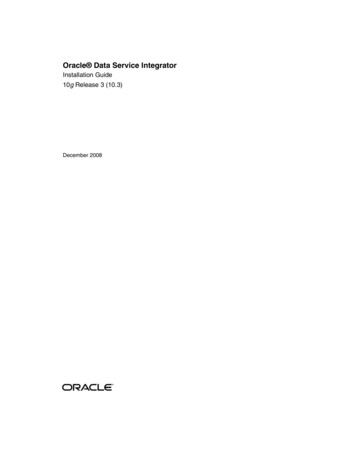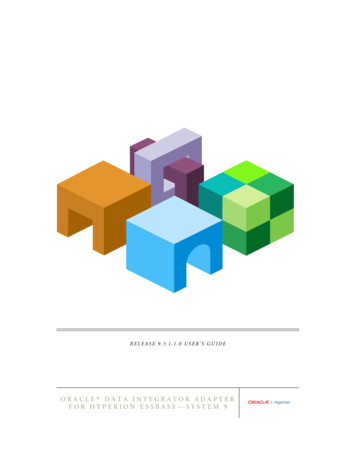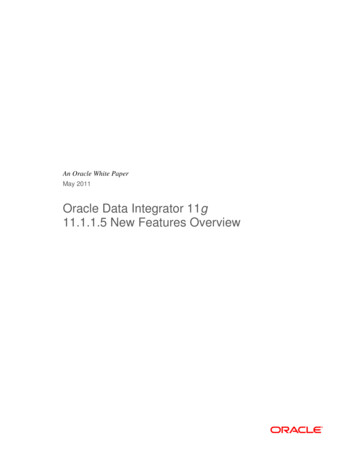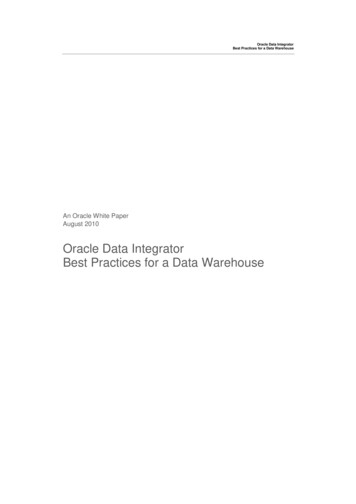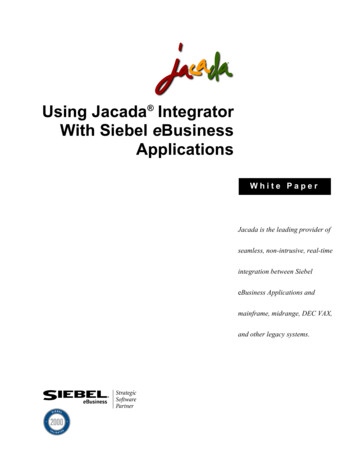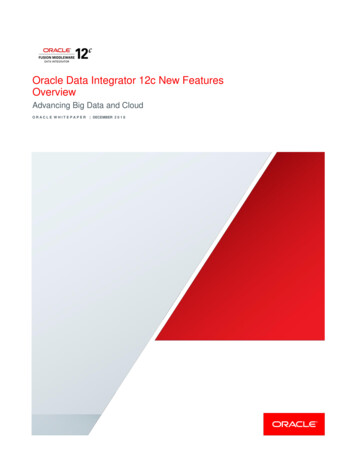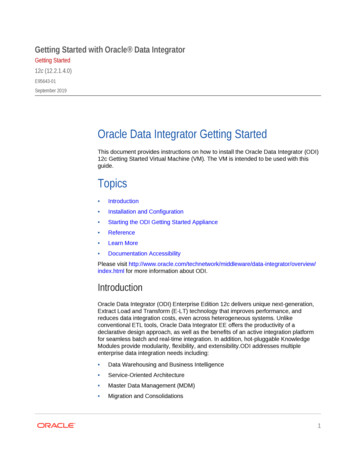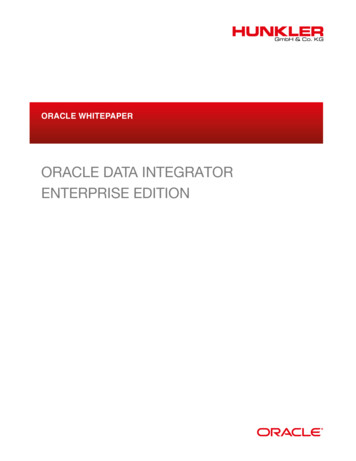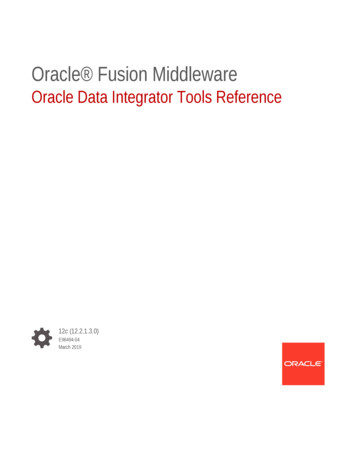
Transcription
Oracle Fusion MiddlewareOracle Data Integrator Tools Reference12c (12.2.1.3.0)E96494-04March 2019
Oracle Fusion Middleware Oracle Data Integrator Tools Reference, 12c (12.2.1.3.0)E96494-04Copyright 2010, 2019, Oracle and/or its affiliates. All rights reserved.Primary Author: Oracle CorporationThis software and related documentation are provided under a license agreement containing restrictions onuse and disclosure and are protected by intellectual property laws. Except as expressly permitted in yourlicense agreement or allowed by law, you may not use, copy, reproduce, translate, broadcast, modify,license, transmit, distribute, exhibit, perform, publish, or display any part, in any form, or by any means.Reverse engineering, disassembly, or decompilation of this software, unless required by law forinteroperability, is prohibited.The information contained herein is subject to change without notice and is not warranted to be error-free. Ifyou find any errors, please report them to us in writing.If this is software or related documentation that is delivered to the U.S. Government or anyone licensing it onbehalf of the U.S. Government, then the following notice is applicable:U.S. GOVERNMENT END USERS: Oracle programs, including any operating system, integrated software,any programs installed on the hardware, and/or documentation, delivered to U.S. Government end users are"commercial computer software" pursuant to the applicable Federal Acquisition Regulation and agencyspecific supplemental regulations. As such, use, duplication, disclosure, modification, and adaptation of theprograms, including any operating system, integrated software, any programs installed on the hardware,and/or documentation, shall be subject to license terms and license restrictions applicable to the programs.No other rights are granted to the U.S. Government.This software or hardware is developed for general use in a variety of information management applications.It is not developed or intended for use in any inherently dangerous applications, including applications thatmay create a risk of personal injury. If you use this software or hardware in dangerous applications, then youshall be responsible to take all appropriate fail-safe, backup, redundancy, and other measures to ensure itssafe use. Oracle Corporation and its affiliates disclaim any liability for any damages caused by use of thissoftware or hardware in dangerous applications.Oracle and Java are registered trademarks of Oracle and/or its affiliates. Other names may be trademarks oftheir respective owners.Intel and Intel Xeon are trademarks or registered trademarks of Intel Corporation. All SPARC trademarks areused under license and are trademarks or registered trademarks of SPARC International, Inc. AMD, Opteron,the AMD logo, and the AMD Opteron logo are trademarks or registered trademarks of Advanced MicroDevices. UNIX is a registered trademark of The Open Group.This software or hardware and documentation may provide access to or information about content, products,and services from third parties. Oracle Corporation and its affiliates are not responsible for and expresslydisclaim all warranties of any kind with respect to third-party content, products, and services unless otherwiseset forth in an applicable agreement between you and Oracle. Oracle Corporation and its affiliates will not beresponsible for any loss, costs, or damages incurred due to your access to or use of third-party content,products, or services, except as set forth in an applicable agreement between you and Oracle.
ContentsPreface1AudienceviDocumentation AccessibilityviRelated DocumentsviConventionsviiUsing Oracle Data Integrator Open ToolsUsing Oracle Data Integrator Tools1-1Using a Tool in a Package1-1Using a Tool in a Knowledge Module or Procedure Command1-2Using a Tool From a Command Line1-2Using Open ToolsInstalling and Declaring an Open Tool1-3Installing an Open Tool1-3Declaring a New Open Tool1-3Using Open Tools in a Package or ProcedureDeveloping Open Tools1-41-4Classes1-4Developing a New Open Tool1-5Implementing the ClassOpen Tools at Runtime21-21-51-8Oracle Data Integrator ToolsOracle Data Integrator Tools by Category2-1Metadata2-1Oracle Data Integrator Objects2-1Utilities2-1Internet Related Tasks2-2Files2-2SAP2-3XML2-3iii
Event Detection2-3Changed Data Capture2-3Alphabetical List of Oracle Data Integrator nvokeRESTfulService2-48Usage Recommendations for odiInvokeRESTfulService tool2-60Examples for Pagination2-62Examples for Chunk OutFile2-89iv
ntArchive2-104OdiSAPALEClient and OdiSAPALEClient32-105OdiSAPALEServer and lit2-153OdiZip2-157v
PrefacePrefaceThis guide describes how to use and develop Open Tools using Oracle Data Integratorto design integration scenarios.AudienceThis document is intended for Oracle Data Integrator application developers who willuse Open Tools to design integration scenarios.Documentation AccessibilityFor information about Oracle's commitment to accessibility, visit the OracleAccessibility Program website at http://www.oracle.com/pls/topic/lookup?ctx acc&id docacc.Access to Oracle SupportOracle customers that have purchased support have access to electronic supportthrough My Oracle Support. For information, visit http://www.oracle.com/pls/topic/lookup?ctx acc&id info or visit http://www.oracle.com/pls/topic/lookup?ctx acc&id trsif you are hearing impaired.Related DocumentsFor more information, see the following documents in Oracle Data Integrator Library: Release Notes for Oracle Data Integrator Release Notes Understanding Oracle Data Integrator Developing Integration Projects with Oracle Data Integrator Installing and Configuring Oracle Data Integrator Upgrading Oracle Data Integrator Integrating Big Data with Oracle Data Integrator Application Adapters Guide for Oracle Data Integrator Developing Knowledge Modules with Oracle Data Integrator Connectivity and Knowledge Modules Guide for Oracle Data Integrator Migrating From Oracle Warehouse Builder to Oracle Data Integrator Oracle Data Integrator Tools Reference Data Services Java API Reference for Oracle Data Integratorvi
Preface Open Tools Java API Reference for Oracle Data Integrator Getting Started with SAP ABAP BW Adapter for Oracle Data Integrator Java API Reference for Oracle Data Integrator Getting Started with SAP ABAP ERP Adapter for Oracle Data Integrator Oracle Data Integrator 12c Online Help, which is available in ODI Studio throughthe JDeveloper Help Center when you press F1 or from the main menu byselecting Help, and then Search or Table of Contents.ConventionsThe following text conventions are used in this document:ConventionMeaningboldfaceBoldface type indicates graphical user interface elements associatedwith an action, or terms defined in text or the glossary.italicItalic type indicates book titles, emphasis, or placeholder variables forwhich you supply particular values.monospaceMonospace type indicates commands within a paragraph, URLs, codein examples, text that appears on the screen, or text that you enter.vii
1Using Oracle Data Integrator Open ToolsThis appendix provides a reference of Oracle Data Integrator (ODI) tools. It describeshow to use Open Tools to develop new scenarios in Oracle Data Integrator.This appendix includes the following sections:Using Oracle Data Integrator ToolsOracle Data Integrator tools (also called Oracle Data Integrator commands) arecommands provided for performing specific tasks at runtime. These tasks can be assimple as waiting for a certain time or producing a sound, or as sophisticated asexecuting Ant scripts or reading e-mail from a server.Oracle Data Integrator tools are used in Packages, Procedure Commands, KnowledgeModules Commands, or directly from a command line.Note:Previous versions of Oracle Data Integrator supported calling built-in toolsfrom Jython or Java scripts using their internal Java classes (such asSnpsSendMail and SendMail). This approach is no longer supported.Note:Carriage returns in commands are not permitted.Using a Tool in a PackageAdding and using an Oracle Data Integrator tool in a Package is described in AddingOracle Data Integrator Tool Steps in Developing Integration Projects with Oracle DataIntegrator.You can sequence the tool steps within the package and organize them according totheir success and failure. For more information about sequencing, see Arranging theSteps Layout and Defining the Sequence of Steps in Developing Integration Projectswith Oracle Data Integrator.You can use variable values, sequences, or Oracle Data Integrator substitutionmethod calls directly in tool parameters.1-1
Chapter 1Using Open ToolsUsing a Tool in a Knowledge Module or Procedure CommandUsing an Oracle Data Integrator tool in a Knowledge Module or Procedure is describedin Working with Procedures section in Developing Integration Projects with OracleData Integrator Guide.You can use variable values, sequences, Oracle Data Integrator substitution methodcalls, or the results from a SELECT statement directly in tool parameters.Using a Tool From a Command LineCommand line scripts for Oracle Data Integrator tools are run from theDOMAIN HOME/bin directory. To run a tool from a command line, you must firstcreate an ODI Physical Agent instance in the ODI Topology and configure an ODIStandalone Agent instance in a Domain. For more information about performing thesetasks, see Installing and Configuring Oracle Data Integrator.When you run a tool from a command line, you must specify the -INSTANCE parameter,where agent name is the name of the physical agent you configured (for example,OracleDIAgent1).To use an Oracle Data Integrator tool from a command line:1.Launch the command shell for your environment (Windows or UNIX).2.Navigate to the DOMAIN HOME/bin directory.3.Launch the startcmd.cmd (Windows) or startcmd.sh (UNIX) command and runan Oracle Data Integrator tool with the following syntax:startcmd. cmd sh -INSTANCE agent name command name [ command parameters ]*Command names and command parameters are case-sensitive.Example 1-1Important NotesNote the following: On Windows platforms, command arguments that contain equal ( ) signs orspaces must be surrounded with double quotation marks. This differs from theUNIX command call. For example:startcmd.cmd OdiSleep "-INSTANCE OracleDIAgent1" "-DELAY 5000"./startcmd.sh OdiSleep -INSTANCE OracleDIAgent1 -DELAY 5000 The following tools do not support direct invocation through a command CountUsing Open ToolsThe Open Tools feature provides an extensible platform for developing custom thirdparty tools that you can use in Packages and Procedures. As with the standard toolsdelivered with Oracle Data Integrator, Open Tools can interact with the operatingsystem and manipulate data.1-2
Chapter 1Using Open ToolsOpen Tools are written in Java. Writing your own Open Tools is described inDeveloping Open Tools.Open Tools are delivered as a Java package (.zip or .jar) that contains several files: A compiled Java .class file Other resources, such as icon filesInstalling and Declaring an Open ToolBefore you can use an Open Tool, you must install and add it.Installing an Open ToolTo install an Open Tool, you must add the Open Tool JAR into the classpath or thecomponent using the tool.Open Tool JARs must be added to the DOMAIN HOME/lib directory. Drivers areadded to the same location.To deploy an Open Tool JAR with a Java EE agent, generate a server template for thisagent. The Open Tool is displayed in the Libraries and Drivers list in the TemplateGeneration Wizard. See Creating a Server Template for the Java EE Agent inAdministering Oracle Data Integrator for more information.Note:This operation must be performed for each Oracle Data Integrator Studiofrom which the tool is being used, and for each agent that will run sessionsusing this tool.Declaring a New Open ToolThis operation declares an Open Tool in a master repository and enables the tool tobe displayed in Oracle Data Integrator Studio.To declare an Open Tool, a JAR must be added in ide.user.dir /oracledi/userlib.To declare a new tool:1.In Oracle Data Integrator Studio, select the ODI menu and then select AddRemove/Open Tools. The Add Open Tools dialog is displayed.2.Enter the name of the class in the Open Tool Class Name field.or:1.Click Find in the ClassPath, then browse to the name of the Open Tool's Javaclass. To search for the class by name, enter part of the name in the field at thetop.2.Click OK.1-3
Chapter 1Developing Open ToolsNote that all classes currently available to Oracle Data Integrator are displayed,including those that are not Open Tools. You must know the name of your class inorder to add it.3.Click Add Open Tool.4.Select the line containing your Open Tool. If the tool was correctly found on the classpath, the supplied icons and thetool's syntax, description, provider, and version number are displayed. If the tool was not found, an error message is displayed. Change theclasspath, or move the Open Tool to the correct directory.Note:This operation to declare a new Open Tool must be performed only oncefor a given master repository.Note:An Open Tool, a name cannot start with Snp or Odi. An Open Tool with aname that starts with these strings is ignored.Using Open Tools in a Package or ProcedureYou can use Open Tools in a Package or Procedure, similar to the tools provided withOracle Data Integrator.Developing Open ToolsAn Open Tool is a Java package that contains a compiled Java class that implementsthe interface oracle.odi.sdk.opentools.IOpenTool. For a complete description ofclasses and methods, see the Oracle Data Integrator Open Tools Java API Reference(JavaDoc).An Open Tool package typically should also contain two icons, which are used torepresent the Open Tool in the Oracle Data Integrator graphical interface.ClassesThe following table lists and describes Open Tool classes and interfaces.Class or InterfaceDescriptionIOpenToolInterface that every Open Tool must implement.OpenToolAbstractAbstraction of the interface with some helper methods.Preferably extend this class rather than implementingthe interface directly.1-4
Chapter 1Developing Open ToolsClass or InterfaceDescriptionIOpenToolParameterInterface that parameters used by Open Tools mustimplement. In most cases, OpenToolParameter shouldbe used rather than implementing this interface.OpenToolParameterComplete implementation of IOpenToolParameter.Each OpenToolParameter holds one parameter.OpenToolsExecutionExceptionException class that should be thrown if necessary byOpen Tool methods.SimpleOpenToolExampleA simple example of an Open Tool, which can be usedas a starting point.Developing a New Open ToolThe following steps describe the development of a basic Open Tool,SimpleMessageBox. The source code for this class is available in the demo/plugins/src directory.1.Define the syntax. In this example, the Open Tool is called as follows:SimpleMessageBox "-TEXT text message " "-TITLE window title "2.Create 16x16 and 32x32 icons (usually in .gif format).3.Create and implement the class. See Implementing the Class.4.Compile the class and create a package with the two icon files.5.Install and declare the Open Tool as described in Installing and Declaring an OpenTool.Implementing the ClassImplementing the class consists of the following steps:1.Declaration2.Importing Packages3.Defining the Parameters4.Implementing Informational Functions5.ExecutionDeclarationBefore you declare the class, you must name the package.Naming the PackagePut the class in a package named appropriately. The package name is used to identifythe Open Tool when installing it.package com.myCompany.OpenTools;Declaring the ClassThere are two basic approaches to developing an Open Tool:1-5
Chapter 1Developing Open Tools Extend an existing class that you want to convert into an Open Tool. In this case,simply implement the interface IOpenTool directly on the existing class. Develop a new class. In this case, it is easiest to extend the abstract classOpenToolAbstract. This abstract class also contains additional helper methods forworking with parameters.public class SimpleMessageBox extends OpenToolAbstract {Importing PackagesAlmost every Open Tool must import the following Open Tool SDK packages:import oracle.odi.sdk.opentools.IOpenTool; /* All Open Tool classes need these threeclasses */import oracle.odi.sdk.opentools.IOpenToolParameter;import n;import oracle.odi.sdk.opentools.OpenToolAbstract; /* The abstract extended for theOpen Tool */import oracle.odi.sdk.opentools.OpenToolParameter; /* The class used for parameters*/In this particular example, a package to create the message box is also needed:import javax.swing.JOptionPane; /* Needed for the message box used in this example */Defining the ParametersAdd a property to store the OpenToolParameter objects. This is used to both definethem for the syntax, and to retrieve the values of the parameters from the eventualuser. It is easiest to define the parameters of the Open Tool with a static array asfollows. This array should be private, as it will be accessed through an accessorfunction.private static final IOpenToolParameter[] mParameters new IOpenToolParameter[]{new OpenToolParameter("-TEXT", "Message text", "Text to show in the messagebox(Mandatory).", true),new OpenToolParameter("-TITLE", "Messagebox title", "Title of the messagebox.",false)};The four parameters passed to the OpenToolParameter() constructor are as follows:1.The code of the parameter, including the initial hyphen. This code mustcorrespond to the syntax returned by getSyntax().2.The user-friendly name, which is used if the user is using the graphical interface toset parameters.3.A descriptive help text.4.Whether the parameter is mandatory. This is an indication to the user.1-6
Chapter 1Developing Open ToolsNote:Oracle Data Integrator does not enforce the mandatory flag onparameters. Your class must be able to handle any combination ofparameters being provided.You must implement the accessor function getParameters() to retrieve theparameters:public IOpenToolParameter[] getParameters(){return mParameters;}Implementing Informational FunctionsImplement functions to return information about your Open Tool: getDescription(),getVersion(), getProvider().public String getDescription() { return "This Open Tool displays a message box whenexecuted."; }public String getVersion() { return "v1.0"; }public String getProvider() { return "My Company, Inc."; }The getSyntax() function determines the name of the Open Tool as it is displayed inthe Oracle Data Integrator graphical interface, and also the initial values of theparameter. Make sure the names of the parameters here match the names of theparameters returned by getParameters().public String getSyntax(){return "SimpleMessageBox \"-TEXT text message \" \"-TITLE window title \"";}The getIcon() method should then return paths to two appropriately sized images. Itshould look something like this:public String getIcon(int pIconType){switch (pIconType){case IOpenTool.SMALL ICON:return "/com/myCompany/OpenTools/images/SimpleMessageBox 16.gif";case IOpenTool.BIG ICON:return "/com/myCompany/OpenTools/images/SimpleMessageBox 32.gif";default:return "";}}ExecutionFinally, the execute() method, which carries out the functionality provided by theOpen Tool. In this case, a message box is shown. If you are extending theOpenToolAbstract class, use the getParameterValue() method to easily retrieve thevalues of parameters, as they are set at runtime.1-7
Chapter 1Developing Open ToolsNote:You must catch all exceptions and only raise anOpenToolExecutionException.public void execute() throws OpenToolExecutionException{try{if (getParameterValue("-TITLE") null getParameterValue("TITLE").equals("")) /* title was not filled in by user */{JOptionPane.showMessageDialog(null, (String) getParameterValue("TEXT"), (String) "Message", JOptionPane.INFORMATION MESSAGE);} else{JOptionPane.showMessageDialog(null, (String) getParameterValue("TEXT"),(String) N MESSAGE);}}/* Traps any exception and throw them as OpenToolExecutionException */catch (IllegalArgumentException e){throw new OpenToolExecutionException(e);}}Open Tools at RuntimeIn general, your Open Tool class is instantiated only very briefly, and is used in thefollowing ways.InstallationWhen the user chooses to install an Open Tool, Oracle Data Integrator instantiates theclass and calls the methods getDescription(), getProvider(), getIcon(), andgetVersion() to retrieve information about the class.Use in a PackageWhen the Open Tool is used in a package, the class is instantiated briefly to call themethods getDescription(), getProvider(), getIcon(), and getVersion().Additionally, getSyntax() is called to retrieve the code name of the Open Tool and itsdefault arguments. The method getParameters() is called to display the list ofarguments to the user.ExecutionEach time the Open Tool is executed in a package or procedure, the class isinstantiated again; it has no persistence after its execution. The execute() method iscalled just once.1-8
Chapter 1Developing Open ToolsTip:See also Using Open Tools and Open Tools SDK documentation (JavaDoc).1-9
2Oracle Data Integrator ToolsThis chapter lists all the Oracle Data Integrator Tools by category and describes itscommands and parameters.Oracle Data Integrator Tools by CategoryThis section lists Oracle Data Integrator tools by category.Metadata OdiReverseGetMetaData OdiReverseManageShortcut OdiReverseResetTable OdiReverseSetMetaDataOracle Data Integrator Objects OdiApplyDeploymentArchive OdiCreateDeploymentArchive OdiDeleteScen OdiExportAllScen OdiExportEnvironmentInformation OdiExportLog OdiExportMaster OdiExportObject OdiExportScen OdiExportWork OdiGenerateAllScen OdiImportObject OdiImportScen OdiRollbackDeploymentArchive OdiLockUnlockVCSRepository OdiAnt OdiBeepUtilities2-1
Chapter 2Oracle Data Integrator Tools by Category OdiEnterpriseDataQuality OdiKillAgent OdiObjectStorageDelete OdiObjectStorageDownload OdiObjectStorageUpload OdiOSCommand OdiPingAgent OdiPurgeLog OdiReinitializeSeq OdiRemoveTemporaryObjects OdiRetrieveHadoopLog OdiStorageCSDownload OdiStorageCSUpload OdiStartLoadPlan OdiStartOwbJob OdiStartScen OdiUpdateAgentScheduleInternet Related Tasks OdiFtp OdiFtpGet OdiFtpPut OdiInvokeRESTfulService OdiInvokeWebService OdiReadMail OdiScpGet OdiScpPut OdiSftp OdiSftpGet OdiSftpPut OdiSendMail OdiFileAppend OdiFileCopy OdiFileDelete OdiFileMoveFiles2-2
Chapter 2Alphabetical List of Oracle Data Integrator Tools OdiFileWait OdiMkDir OdiOutFile OdiSqlUnload OdiUnZip OdiZip OdiSAPALEClient and OdiSAPALEClient3 OdiSAPALEServer and OdiSAPALEServer3 OdiXMLConcat OdiXMLSplitSAPXMLEvent Detection OdiFileWait OdiReadMail OdiSleep OdiWaitForChildSession OdiWaitForData OdiWaitForLoadPlans OdiWaitForLogData OdiWaitForTableChanged Data Capture OdiManageOggProcess OdiOggCommand OdiRefreshJournalCount OdiRetrieveJournalData OdiWaitForData OdiWaitForLogData OdiWaitForTableAlphabetical List of Oracle Data Integrator ToolsThis section lists Oracle Data Integrator tools in alphabetical order. OdiAnt2-3
Chapter 2Alphabetical List of Oracle Data Integrator Tools OdiApplyDeploymentArchive OdiBeep OdiCreateDeploymentArchive OdiDeleteScen OdiEnterpriseDataQuality OdiExportAllScen OdiExportEnvironmentInformation OdiExportLog OdiExportMaster OdiExportObject OdiExportScen OdiExportWork OdiFileAppend OdiFileDelete OdiFileCopy OdiFileMove OdiFileWait OdiFtp OdiFtpGet OdiFtpPut OdiGenerateAllScen OdiImportObject OdiImportScen OdiInvokeRESTfulService OdiInvokeWebService OdiKillAgent OdiManageOggProcess OdiMkDir OdiObjectStorageDownload OdiObjectStorageUpload OdiObjectStorageDelete OdiOggCommand OdiOSCommand OdiOutFile OdiPingAgent OdiPurgeLog OdiReadMail2-4
Chapter 2Alphabetical List of Oracle Data Integrator Tools OdiRefreshJournalCount OdiReinitializeSeq OdiRemoveTemporaryObjects OdiRetrieveHadoopLog OdiRetrieveJournalData OdiReverseGetMetaData OdiReverseManageShortcut OdiReverseResetTable OdiReverseSetMetaData OdiRollbackDeploymentArchive OdiSAPALEClient and OdiSAPALEClient3 OdiSAPALEServer and OdiSAPALEServer3 OdiScpGet OdiScpPut OdiSendMail OdiSftp OdiSftpGet OdiSftpPut OdiSleep OdiSqlUnload OdiStartLoadPlan OdiStartOwbJob OdiStartScen OdiStorageCSDownload OdiStorageCSUpload OdiLockUnlockVCSRepository OdiUnZip OdiUpdateAgentSchedule OdiWaitForChildSession OdiWaitForData OdiWaitForLoadPlans OdiWaitForLogData OdiXMLConcat OdiXMLSplit OdiZip2-5
Chapter 2Alphabetical List of Oracle Data Integrator ToolsOdiAntUse this command to execute an Ant buildfile.For more details and examples of Antbuildfiles, refer to the online documentation: geOdiAnt -BUILDFILE file -LOGFILE file [-TARGET target ][-D property name property value ]* [-PROJECTHELP] [-HELP][-VERSION] [-QUIET] [-VERBOSE] [-DEBUG] [-EMACS][-LOGGER classname ] [-LISTENER classname ] [-FIND file E file YesAnt buildfile. XML file containing theAnt commands.-LOGFILE file YesUse given file for logging.-TARGET target NoTarget of the build process.-D property name propertyvalue NoUsed to pass the properties with itsvalue to Ant buildfile-PROJECTHELPNoDisplays the help on the project.-HELPNoDisplays Ant help.-VERSIONNoDisplays Ant version.-QUIETNoRun in nonverbose mode.-VERBOSENoRun in verbose mode.-DEBUGNoPrints debug information.-EMACSNoDisplays the logging informationwithout adornments.-LOGGER classname NoJava class performing the logging.-LISTENER classname NoAdds a class instance as a listener.-FIND file NoLooks for the Ant buildfile from theroot of the file system and uses it.ExamplesDownload the *.html files from the directory /download/public using FTP fromftp.example.com to the directory C:\temp.Step 1: Generate the Ant buildfile.OdiOutFile -FILE c:\temp\ant cmd.xml ?xml version "1.0"? project name "myproject" default "ftp" basedir "/" target name "ftp" ftp action "get" remotedir "/download/public"server "ftp.example.com" userid "anonymous"password "me@example.com" fileset dir "c:\temp" 2-6
Chapter 2Alphabetical List of Oracle Data Integrator Tools include name "**/*.html"/ /fileset /ftp /target /project Step 2: Run the Ant buildfile.OdiAnt -BUILDFILE c:\temp\ant cmd.xml -LOGFILE c:\temp\ant cmd.logOdiApplyDeploymentArchiveUse this command to apply an Initial/Patch Deployment Archive (DA) onto an ODIrepository.UsageOdiApplyDeploymentArchive -ARCHIVE FILE NAME archive file name [-APPLY WITHOUT CIPHER DATA yes no ] [-EXPORT KEY Export Key ][-CREATE ROLLBACK ARCHIVE yes no ][-ROLLBACK FILE NAME rollback file name ][-INCLUDE PHYSICAL TOPOLOGY yes no ]ParametersParameterMandatoryDescriptionARCHIVE FILE NAME archive f Yesile name Full path/Complete name of thedeployment archive zip file.APPLY WITHOUT CIPHER DATA y No1es no If set to yes, any cipher data presentin the deployment archive will bemade null. If set to no, the export keywill be used to migrate the cipherdata. The default value is No.2-7
Chapter 2Alphabetical List of Oracle Data Integrator ToolsParameterMandatoryDescriptionEXPORT KEY Export Key NoSpecifies a cryptographic private keyused to migrate cipher data in thedeployment archive objects.Note:TheEXPORTKEYparametershouldbe anencryptedstring.Forinformation ontheencodingprocess, seeEncoding aPassword inAdministeringOracleDataIntegrator.2-8
Chapter 2Alphabetical List of Oracle Data Integrator ToolsParameterMandatoryDescriptionCREATE ROLLBACK ARCHIVE yes no No2Specifies if a rollback deploymentarchive must be created. If set toYes, a rollback deployment archivewill be created before applying thepatch. If set to No, the rollbackdeployment archive will not becreated.Note:Thisoptionisapplicable onlyto thepatchdeploymentarchive.ROLLBACK FILE NAME rollback Nofile name Complete file name of the rollbackdeployment archive.INCLUDE PHYSICAL TOPOLOGY y Noes no Specifies if the Physical TopologyObjects in the deployment archiveshould be applied onto the targetrepository. The default value is Yes.12If the APPLY WITHOUT CIPHER DATA parameter is set to No, the EXPORT KEY parameter must be specified.If the CREATE ROLLBACK ARCHIVE parameter is set to Yes, the ROLLBACK FILE NAME parameter must be specified.ExamplesPatch a repository using a patc
Migrating From Oracle Warehouse Builder to Oracle Data Integrator Oracle Data Integrator Tools Reference Data Services Java API Reference for Oracle Data Integrator . Oracle Data Integrator 12c Online Help, which is available in ODI Studio through the JDeveloper Help Center when you press F1 or from the main menu by
